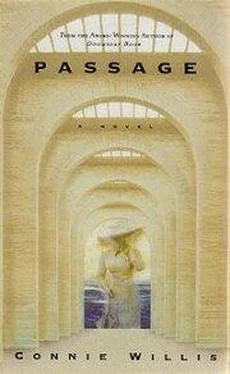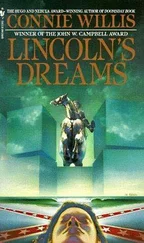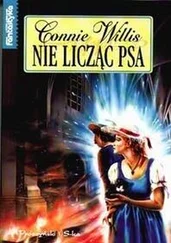She chattered on while the nurse checked the monitor, adjusted dials, and checked the readouts. It had nothing to do with NDEs, but Joanna hadn’t really expected it to. Maisie had spent the better part of three years in hospitals—she knew exactly how to distract nurses, put off unpleasant procedures, and, above all, get people to stay and keep her company.
“All right, now don’t get out of bed,” the nurse ordered. “See that she rests,” she said to Joanna and went out.
“You heard what she said,” Joanna said, standing up. “How about if I come see you tomorrow morning?”
“No,” Maisie said. “You can’t go yet. I haven’t told you about the NDE thing yet. You know how I didn’t see anything that time I almost died, and Mr. Mandrake said I did, that everybody sees a tunnel and an angel. Well, they don’t. This guy, he worked on the Hindenburg, and he was up inside the balloon part when it blew up, and everybody else fell off, but he didn’t. He hung on to the metal struts and it was really hot. His hands got all burned into these black claws,” she demonstrated, “and he wanted to let go, but he didn’t. He squinched his eyes shut”—she demonstrated—“and he saw all these different things.”
She unfolded the paper and handed it to Joanna. It was a Xerox of a page out of a book. “I don’t know if it was a real near-death experience or not because, if he was dead, he would have let go, wouldn’t he? But he saw stuff like in one. Snow and a train and a whale flipping its tail up out of the ocean.”
She leaned forward, careful not to unhook her electrodes, and handed the folded paper to Joanna. “I like the part the best when he’s in the birdcage and he has to hang on with his feet like on a trapeze so he won’t fall into the fire.”
Joanna unfolded the paper and read the account of what the crewman had seen: glittering white fields and the whale Maisie had described and then the sensation of a train going by. He had been surprised that it didn’t stop, he had decided it must be an express, but that couldn’t be right. There was no express to Bregenz.
Joanna looked up. “I think you’re right, Maisie,” she said. “I think this was a near-death vision.”
“I know,” Maisie said. “I figured it was when I read about him seeing the snow, because it’s white like the light everybody says they see. Did you get to the part where the snow turns into flowers?”
“No,” Joanna said and began reading again. He had seen his grandmother, sitting by the fire, and then himself as a bird in a cage being thrown into it, and then the white fields again, but not of snow, of apple blossoms in fields stretching beneath him in endless heavenly meadows.
“Well, what do you think?” Maisie said impatiently.
I wish he were one of my interview subjects, Joanna thought. His account was full of details and, except for the mention of the heavenly meadows, devoid of the standard religious imagery and tunnels and brilliantly white lights. The kind of NDE account she dreamed of and hardly ever got.
“I think he was brave to keep hanging on, don’t you?” Maisie said, “with his hands hurting so bad and everything.”
“Yes,” Joanna said. “Can I keep this?”
“That’s what I made Nurse Barbara copy it for, so you could use it in your research.”
“Thank you,” Joanna said, and folded the paper up again.
“I don’t think I could’ve,” Maisie said thoughtfully. “I think I would’ve probably let go.”
Joanna stopped in the act of sticking the paper in her pocket. “I’ll bet you would’ve hung on,” she said.
Maisie looked seriously at her for a long minute, and then said, “Did I help you with your research?”
“You did,” Joanna said. “You can be my research assistant anytime.”
“I’m going to look for other ones,” she said. “I’ll bet lots of people in disasters had them, like during earthquakes and stuff.”
I’ll bet they did, Joanna thought.
“I’ll bet the people at Mount St. Helens realty had them.” She shoved the covers back and started to get out of bed.
“Not so fast,” Joanna said. “You’re all hooked up. You can only be my research assistant if you do what the nurses tell you. I mean it. You’re supposed to be resting.”
“I was just getting my earthquake book,” Maisie said. “It’s on the windowsill. I can rest and read at the same time.”
I’ll bet, Joanna thought, getting the book for her. “You can read for fifteen minutes, that’s it.”
“I promise,” Maisie said, already opening the book. “I’ll page you when I find some more.”
Joanna nodded. “I’ll see you later, kiddo,” she said, giving Maisie’s foot under the covers a squeeze, and started for the door.
“Don’t leave!” Maisie said, and when Joanna turned around, “I have to show you this picture of the piano.”
“Okay. One picture,” Joanna said, “and then I have to go.”
Three pictures of the piano and the smoking skeleton-like wreck of the Hindenburg later she finally succeeded in getting away from Maisie and back to her office. And at some point along the way, her second wind deserted her, and she felt utterly exhausted.
Too exhausted to water her Swedish ivy or listen to her voice messages, even though her answering machine was blinking in the double-time that meant it was full. She laid her turned-off pager on the desk, got her coat and gloves, and locked the office behind her.
“Oh, good, you haven’t left yet,” Vielle said. Joanna turned around. Vielle was coming down the hall toward her, still in her dark blue scrubs and surgical cap.
“What are you doing up here?” Joanna asked. “Please tell me it’s not another NDE.”
“No, all quiet on the western front,” she said, pulling her surgical cap off and shaking out the tangle of narrow black braids. “I came up to see if Dr. Right ever found you, and to ask you what movies you wanted me to rent for Dish Night Thursday.”
Dish Night was their weekly movie rental night. “I don’t know,” Joanna said wearily. “Nothing with dying in it.”
“I know,” Vielle said. “I never got a chance to talk to you after—we worked on him for another twenty minutes, but it was no use. He was gone.”
Gone, Joanna thought. NDEers weren’t the only ones who talked about going and coming back in regard to dying. Doctors and nurses did, too. The patient passed away. He passed over. He left a wife and two children. He passed on. Joanna’s mother had told people her father “slipped away,” and the minister at her mother’s funeral had spoken of “the dear departed” and “those who have gone before us.” Gone where?
“It’s always bad when they go like that, with no warning,” Vielle said, “especially when they’re as young as he was. I wanted to make sure you were okay.”
“I’m okay,” Joanna said. “It’s just—what do you think he meant, ‘It’s too far for her to come’?”
“He was pretty far gone when his girlfriend arrived,” Vielle said. “I don’t think he realized she was there.”
No, Joanna thought, that wasn’t it. “He kept saying ‘fifty-eight.’ Why would he say that?”
Vielle shrugged. “Who knows? Maybe he was echoing what the nurses were saying. His blood pressure was eighty over fifty.”
It was seventy over fifty, Joanna thought. “Did the cell phone number of his girlfriend have a fifty-eight in it?”
“I don’t remember. By the way, did Dr. Right ever find you? Because if he didn’t, I think you should stop trying to avoid him. I ran into Louisa Krepke on my way up here, and she said he’s a neurologist, absolutely gorgeous, and single.”
“He found me,” Joanna said. “He wants me to work on a research project with him. Studying NDEs.”
Читать дальше












